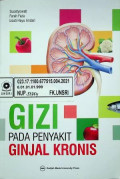
PERBEDAAN KADAR UREUM DAN KREATININ TERHADAP DERAJAT AKI PADA PASIEN SEPSIS
Sepsis is one of the leading causes of acute kidney injury (AKI). Ureum and creatinine testing is a routine diagnostic tool for acute kidney failure. This study aimed to analyze differences in ureu…
- Edition
- -
- ISBN/ISSN
- -
- Collation
- xiv, 165 hlm.; ilus.; 29 cm
- Series Title
- -
- Call Number
- T1607912024

ASUHAN KEPERAWATAN PADA PASIEN CHRONIC KIDNEY DISEASE (CKD) DAN IMPLIKASI TER…
Introduction: Chronic Kidney Disease (CKD) is a gradual, progressive, and permanent decline in kidney function, characterized by a disturbance of the balance of metabolism, fluids, and electrolytes…
- Edition
- -
- ISBN/ISSN
- -
- Collation
- xiv, 344 hlm.; ilus.; tab.; 29 cm.
- Series Title
- -
- Call Number
- T1857172025

KARAKTERISTIK ANEMIA PADA PASIEN PENYAKIT GINJAL KRONIK YANG MENJALANI HEMODI…
Introduction: Anemia is a common complication in Chronic Kidney Disease (CKD) patients, particularly those undergoing hemodialysis. This complication contributes to increased morbidity, mortality, …
- Edition
- -
- ISBN/ISSN
- -
- Collation
- xiv, 165 hlm.; ilus.; 29 cm
- Series Title
- -
- Call Number
- T1607672024

PENINGKATAN KINERJA SISTEM DETEKSI BATU GINJAL PADA CITRA CT SCAN MENGGUNAKAN…
Kidney stones are a condition that can interfere with kidney function and if left untreated can increase the risk of various health problems, such as chronic kidney disease, end-stage renal failure…
- Edition
- -
- ISBN/ISSN
- -
- Collation
- xiv, 61 hlm.; ilus.; tab.; 29 cm.
- Series Title
- -
- Call Number
- T1827782025

ASUHAN KEPERAWATAN PADA PASIEN DENGAN CHRONIC KIDNEY DISEASE YANG MENJALANI H…
Nursing Care for Patients with Chronic Kidney Disease Undergoing Hemodialysis and the Nursing Implications of Sipping Ice Cube Therapy for Managing Hypervolemia 1Elita Meliana Sary, 2Sigit Purwanto…
- Edition
- -
- ISBN/ISSN
- -
- Collation
- xvi, 175 hlm.; ilus.; tab.; 29 cm.
- Series Title
- -
- Call Number
- T1828382025

HUBUNGAN STATUS GIZI DENGAN KUALITAS HIDUP PASIEN GAGAL GINJAL KRONIK YANG ME…
About 10% of the world's population lives with chronic kidney disease and continues to increase, including in Indonesia. Patients diagnosed with chronic kidney disease usually get hemodialysis ther…
- Edition
- -
- ISBN/ISSN
- -
- Collation
- xv, 111 hlm.; ilus.; tab.; 29 cm.
- Series Title
- -
- Call Number
- T1688822025

KAJIAN DRUG RELATED PROBLEMS (DRPs) PADA PASIEN GAGAL GINJAL KRONIK DENGAN AT…
Chronic renal failure is a condition in which kidney function decreases progressively and can cause various complications that can increase the potential for Drug Related Problems (DRPs). The purpo…
- Edition
- -
- ISBN/ISSN
- -
- Collation
- xix, 66 hlm.; ilus.; tab.; 29 cm.
- Series Title
- -
- Call Number
- T1419422024

HUBUNGAN DERAJAT KEPARAHAN PENYAKIT GINJAL KRONIK DENGAN GANGGUAN TIDUR PADA …
Background. Chronic kidney disease (CKD) stands as a significant global public health concern characterized by a decline in glomerular filtration rate (GFR) below 90 mL/min/1.73 m2 and kidney impai…
- Edition
- -
- ISBN/ISSN
- -
- Collation
- xvii, 88 hlm.; Ilus.; 29 cm
- Series Title
- -
- Call Number
- T1370232023

HUBUNGAN ANTARA MANIFESTASI GINJAL DAN STADIUM NEFRITIS LUPUS BERDASARKAN GAM…
Background: Lupus nephritis is a term that refers to serious kidney involvement from systemic lupus erythematosus (SLE), characterized by the presence of immune complex deposits in the anatomical c…
- Edition
- -
- ISBN/ISSN
- -
- Collation
- xvi, 95 hlm.; Ilus.; 29 cm
- Series Title
- -
- Call Number
- T1375402023

HUBUNGAN INTERDIALYTIC WEIGHT GAIN (IDWG) DAN STATUS GIZI DENGAN KUALITAS HID…
Chronic Kidney Disease (CKD) is kidney organ disorder caused by decreasing kidney function permanently. Interdialytic Weight Gain (IDWG) and malnutrition are common problems in patients undergoing …
- Edition
- -
- ISBN/ISSN
- -
- Collation
- xvi, 75 hlm.; Ilus.; 29 cm
- Series Title
- -
- Call Number
- T1301712023

KORELASI ASUPAN CAIRAN, KALIUM, DAN NATRIUM DENGAN INTERDIALYTIC WEIGHT GAIN …
Hemodialysis is performed on Chronic Renal Failure patients as a treatment. One of the problems that often occurs in CKD patients undergoing hemodialysis is an increase in IDWG. There are several f…
- Edition
- -
- ISBN/ISSN
- -
- Collation
- xiv, 49 hlm.; Ilus.; 29 cm
- Series Title
- -
- Call Number
- T1411482024

FAKTOR-FAKTOR YANG MEMPENGARUHI INTERDIALYTIC WEIGHT GAIN (IDWG) PADA PASIEN …
Chronic kidney disease is an irreversible degenerative disease. This condition causes the kidneys to fail in maintaining fluid balance and metabolism. The most common problem experienced by chronic…
- Edition
- -
- ISBN/ISSN
- -
- Collation
- xix, 109 hlm.; Ilus.; 29 cm
- Series Title
- -
- Call Number
- T1411492024

STOP GAGAL GINJAL DAN GANGGUAN GANGGUAN GINJAL LAINNYA : Seputar Ginjal dan R…
- Edition
- -
- ISBN/ISSN
- 978-602-0862-06-4
- Collation
- vii, 219 hlm.; illus.; 24 cm.
- Series Title
- -
- Call Number
- 616.6 Ari s
- Edition
- -
- ISBN/ISSN
- 978-602-0862-06-4
- Collation
- vii, 219 hlm.; illus.; 24 cm.
- Series Title
- -
- Call Number
- 616.6 Ari s

Klien Gagal Ginjal Kronik
- Edition
- 1
- ISBN/ISSN
- 978-979-044-281-8
- Collation
- x, 71hlm.; 21cm
- Series Title
- Seri Asuhan Keperawatan
- Call Number
- 616.61 Bay k
- Edition
- 1
- ISBN/ISSN
- 978-979-044-281-8
- Collation
- x, 71hlm.; 21cm
- Series Title
- Seri Asuhan Keperawatan
- Call Number
- 616.61 Bay k

GIZI PADA PENYAKIT GINJAL KRONIS
- Edition
- 1
- ISBN/ISSN
- 978-602-386-178-1
- Collation
- xiii, 171hlm.; ilus.; 23cm
- Series Title
- -
- Call Number
- 616.61 Sus g
- Edition
- 1
- ISBN/ISSN
- 978-602-386-178-1
- Collation
- xiii, 171hlm.; ilus.; 23cm
- Series Title
- -
- Call Number
- 616.61 Sus g

HUBUNGAN DERAJAT PENYAKIT GINJAL KRONIK DENGAN KELAINAN KARDIOVASKULAR PADA A…
Chronic kidney disease (CKD) is a serious health problem in children with mortality and morbidity rates increasing every year. Patients with CKD often have traditional risk factors such as hyperten…
- Edition
- -
- ISBN/ISSN
- -
- Collation
- xv, 59 hlm.; Ilus.; 29 cm
- Series Title
- -
- Call Number
- T875642022

ASUHAN KEPERAWATAN PADA PASIEN CKD DISERTAI HIPERTENSI DAN APLIKASI TERAPI RO…
Kidney failure causes the function of the kidneys to decrease until they are unable to function properly. the most widely used kidney failure teratment tecnique is hemodialysis. one of the most com…
- Edition
- -
- ISBN/ISSN
- -
- Collation
- ix, 73 hlm.; Ilus.; 29 cm
- Series Title
- -
- Call Number
- T912082023

MEMAHAMI INTERPRETASI PEMERIKSAAN LABORATORIUM PENYAKIT GINJAL KRONIS
- Edition
- 1
- ISBN/ISSN
- 978-602-432-803-0
- Collation
- xv, 124hlm.; ilus.; 24cm
- Series Title
- -
- Call Number
- 616.61 Sus m
- Edition
- 1
- ISBN/ISSN
- 978-602-432-803-0
- Collation
- xv, 124hlm.; ilus.; 24cm
- Series Title
- -
- Call Number
- 616.61 Sus m

KARAKTERISTIK JENIS AKSES HEMODIALISA PADA PASIEN CHRONIC KIDNEY DISEASE DI R…
Chronic Kidney Disease (CKD) is a state of abnormality in the structure of the kidneys characterized by a decrease in LFG ≤ 60ml/1.73 m2 for more than 3 months and is a serious health problem in …
- Edition
- -
- ISBN/ISSN
- -
- Collation
- xxi, 76 hlm.; ilus,; 29 cm
- Series Title
- -
- Call Number
- T850052022

KEPADATAN BATU TRAKTUS URINARIUS MENURUT HOUNSFIELD UNIT (HU) BERDASARKAN KOM…
Backgrounds: Urinary stones are one of the most common diseases encountered in urological cases because of their recurrence. Many factors influence the formation of urinary stones, both intrinsic a…
- Edition
- -
- ISBN/ISSN
- -
- Collation
- xx, 67 hlm.; ilus.; 29 cm
- Series Title
- -
- Call Number
- T841152022

GAMBARAN STATUS NUTRISI PADA PASIEN PENYAKIT GINJAL KRONIK YANG MENJALANI HEM…
Background: Malnutrition is a common problem in patients undergoing hemodialysis. Assessment and monitoring of nutritional status in patients need to be done so that malnutrition could be prevented…
- Edition
- -
- ISBN/ISSN
- -
- Collation
- xix, 95 hlm.; ilus.; 29 cm
- Series Title
- -
- Call Number
- T850742022

PATOGENESIS PENYAKIT Ginjal Diabetik; Peran Fungsi Podosit pada Perkembangan …
- Edition
- 1
- ISBN/ISSN
- 978-602-432-573-2
- Collation
- xxi, 225hlm.; 24cm
- Series Title
- -
- Call Number
- 616.61 Sam p
- Edition
- 1
- ISBN/ISSN
- 978-602-432-573-2
- Collation
- xxi, 225hlm.; 24cm
- Series Title
- -
- Call Number
- 616.61 Sam p

GAMBARAN FUNGSI KOGNITIF PADA PASIEN CHRONIC KIDNEY DISEASE (CKD) YANG RUTIN …
Chronic Kidney Disease (CKD) is a gradual abnormality in the structure and function of the kidneys and often leads to renal failure. Cognitive function decline in CKD patients can occur due to seve…
- Edition
- -
- ISBN/ISSN
- -
- Collation
- xix, 103 hlm.; ilus.; 29 cm
- Series Title
- -
- Call Number
- T842592022

FAKTOR RISIKO PROGRESIVITAS PENYAKIT GINJAL KRONIK PADA ANAK SINDROM NEFROTIK…
Background: Nephrotic syndrome (NS) is one of the most common kidney diseases in children. NS can cause complications that are divided into two, which are infections and non-infections. Infections …
- Edition
- -
- ISBN/ISSN
- -
- Collation
- xxi,103 hlm.; ilus.; 29 cm
- Series Title
- -
- Call Number
- T847672022

PENGARUH DURASI ISKEMIA-REPERFUSI PADA ACUTE KIDNEY INJURY (AKI) TERHADAP GAM…
Background: Acute Kidney Injury (AKI) is rapid decline in renal function. Most causes of AKI are ischemia/reperfusion which triggers an inflammatory response and causes renal injury. lnflammation i…
- Edition
- -
- ISBN/ISSN
- -
- Collation
- xvii, 158 hlm.; ill.; tab.; 28 cm.
- Series Title
- -
- Call Number
- T937542019

HUBUNGAN LAMA HEMODIALISIS DENGAN FUNGSI KOGNITIF PADA PASIEN PENYAKIT GINJAL…
Background: Cognitive impairment is common in chronic hemodialysis patients. Approximately 18,8% of 154 hemodialysis patients with cognitive impairment. Lenght of hemodialysis treatment was a facto…
- Edition
- -
- ISBN/ISSN
- -
- Collation
- xv, 73 hlm.; ill.; tab.; 28 cm.
- Series Title
- -
- Call Number
- T937482018

Seri Asuhan Keperawatan; Klien Gangguan Ginjal
- Edition
- 1
- ISBN/ISSN
- 978-979-448-949-9
- Collation
- viii, 155 hlm.; ilus.; 20 cm
- Series Title
- KEPERAWATAN
- Call Number
- 616.61 Bar s
- Edition
- 1
- ISBN/ISSN
- 978-979-448-949-9
- Collation
- viii, 155 hlm.; ilus.; 20 cm
- Series Title
- KEPERAWATAN
- Call Number
- 616.61 Bar s

Sistem Ginjal Dan Saluran Kemih
- Edition
- 1
- ISBN/ISSN
- 978-981-4865-24-1
- Collation
- xvi, 388hlm.; ilus.; 21cm
- Series Title
- -
- Call Number
- 612.46 Jon c
- Edition
- 1
- ISBN/ISSN
- 978-981-4865-24-1
- Collation
- xvi, 388hlm.; ilus.; 21cm
- Series Title
- -
- Call Number
- 612.46 Jon c

GAGAL GINJAL
- Edition
- -
- ISBN/ISSN
- 978-979-22-3440-4
- Collation
- 115 hlm. : ilus. ; 24 cm
- Series Title
- -
- Call Number
- 616.61 Ala g
- Edition
- -
- ISBN/ISSN
- 978-979-22-3440-4
- Collation
- 115 hlm. : ilus. ; 24 cm
- Series Title
- -
- Call Number
- 616.61 Ala g

KARAKTERISTIK DEMOGRAFI DAN KARAKTERISTIK PENYEBAB PASIEN PENYAKIT GINJAL KRO…
Background: End-stage Renal Disease (ESRD) is a decline of renal function substances for over three months and characterized by GFR
- Edition
- -
- ISBN/ISSN
- -
- Collation
- xiv, 97 hlm.; ill.; tab.; 28 cm.
- Series Title
- -
- Call Number
- T887502014





 Computer Science, Information & General Works
Computer Science, Information & General Works  Philosophy & Psychology
Philosophy & Psychology  Religion
Religion  Social Sciences
Social Sciences  Language
Language  Pure Science
Pure Science  Applied Sciences
Applied Sciences  Art & Recreation
Art & Recreation  Literature
Literature  History & Geography
History & Geography